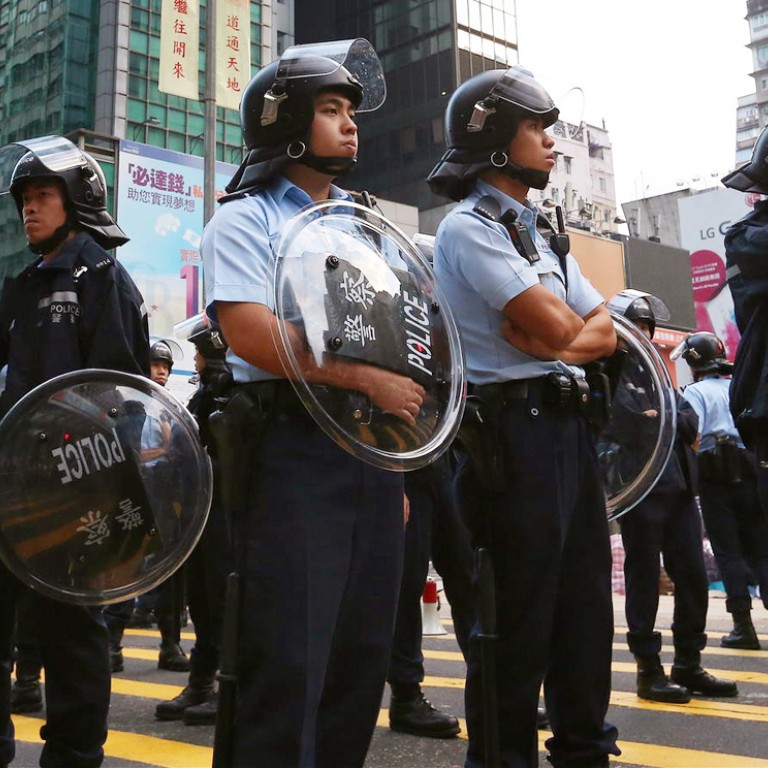
Fears over 'radicals' as protest violence increases, but sources say Beijing won't be embarrassed into action
Protests getting out of hand, says Leung amid claims radical groups and foreign forces are pushing for city's de facto independence
Beijing will not seek a quick end to the political turmoil in Hong Kong to avoid possible embarrassment ahead of some important domestic and international events, sources say.
People familiar with central government thinking also said there were "worrying signs" that radical groups in the city were pushing for the city's de facto political independence under the cover of democracy and were "actively collaborating with foreign forces".
For the first time yesterday, the linked the Occupy movement to an attempt to seek Hong Kong's political independence. It said in a commentary that the movement's organisers wanted Hong Kong to have "self-determination" and even to be "independent".
READ: Don't take your children to Occupy Mong Kok, police warn protesters after quiet night
Protests in Mong Kok are getting increasingly violent as the political elite gather in Beijing for a four-day meeting today.
Dozens of people, including police officers, were injured in clashes over the weekend.
Watch: Dozens injured in clashes between Hong Kong pro-democracy protesters and police
Many officials, including Chief Executive Leung Chun-ying, have said the movement is getting out of control.
"There are external forces getting involved," Leung told a television talk show. "This is not entirely a domestic movement and it is getting out of hand."
Pan-democrat lawmakers, in a joint statement, said the confrontation resulted from Leung's attempt to clear the rally site in Mong Kok. They urged restraint on both sides.
"It is biased to call this movement 'out of control' or 'riotous'. A vast majority of protesters are peaceful," they said.
Police announced they had arrested a 23-year-old man in Tin Shui Wai on Saturday for posting messages online calling on protesters to charge police cordons and to paralyse the railway.
With ministerial-level meetings of the Asia-Pacific Economic Cooperation (Apec) forum in Beijing just a week away, many are watching how the central government handles the protests.
Dong Likun, a retired senior research fellow at the Institute of Hong Kong and Macau Affairs, a think tank under the State Council's Development Research Centre, said Beijing would not feel embarrassed if the protests continued during the Apec meeting. "In a democratic society, it's normal to see arguments, protests and dissenting voices," he said.
Another mainland policy researcher agreed. "Some [in Hong Kong] may think if they make a bigger noise now, the central government will be under international pressure. But Chinese leaders will make no compromise because what the protesters ask is unlawful," he said. "They will also avoid bloodshed. As long as we operate within the framework of the 'one country, two systems' principle, no foreign country can fault China on this."
Dong said Beijing "cannot concede anymore or Hong Kong will be back under a foreign power's control". "I think the central government will reconsider its policies towards Hong Kong ... we have stressed too much on 'two systems' and not enough on 'one country'," he said.
- Televised talks between the Hong Kong government and students have been scheduled for 6-8pm tomorrow. Alex Chow Yong-kang, secretary general of the Federation of Students, said the time would enable more people to watch the coverage live. He said Occupy Central founders and Scholarism had been invited to watch from an adjacent room.
Beijing has full confidence in me, Leung says

Speaking in an interview with ATV World that aired last night, Leung said: "Hong Kong has been fortunate so far that the Hong Kong government, and myself included, have such high level of confidence and support."
Leung noted that "external forces from different countries from different parts of the world" had taken part in the Occupy movement. He rejected the term "crackdown" but said clearing the roads was "a matter of time".
While his popularity has reached an all-time low, Leung did not see himself as a divisive figure. "Not at all. In fact I have achieved quite a few things, particularly in relations between Hong Kong and [the] central authorities," Leung said. "I probably have to do more communicating."
But he refused to say whether he would seek a second term in 2017- although in the same television programme last year, he did indicate his intention to do so.
As for the government's dialogue with students that is to take place tomorrow, Leung reiterated there was no room to accommodate demands for public nomination in the 2017 election.
Meanwhile, Lingnan University president Cheng Kwok-hon, picked by the city's eight universities to moderate tomorrow's meeting, said he would act impartially and his role would have "nothing to do with what I said in the past". Cheng was an adviser to Leung's 2012 election campaign.
Separately, Alex Chow Yong-kang, of the Hong Kong Federation of Students, called accusations that foreign forces were behind the protests "a complete fabrication". He said the protests would continue until the government tabled a "feasible" reform package.


